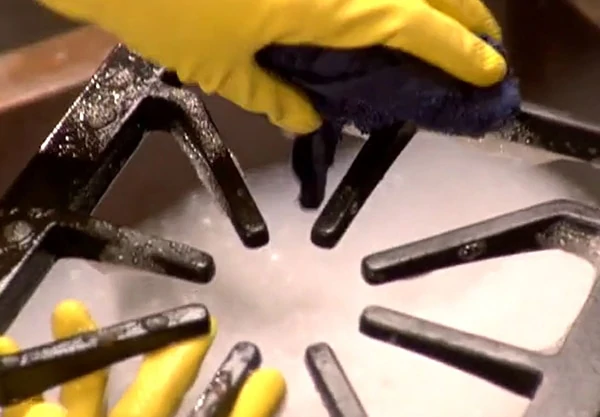Wolf ranges are renowned for their exceptional quality and performance in the kitchen. However, like any appliance, they may encounter issues over time. One common problem that Wolf range owners face is with the grates. The grates play a crucial role in evenly distributing heat and supporting cookware, so addressing any problems promptly is essential to maintain optimal cooking conditions. In this comprehensive guide, we’ll explore DIY solutions for common Wolf range grate problems, helping you troubleshoot and resolve issues efficiently.
Cleaning and Maintenance
Regular cleaning and maintenance are key to preventing and addressing grate problems. Over time, grates can accumulate grease, food particles, and other debris, impacting their performance and appearance. Here are some DIY cleaning solutions to keep your Wolf range grates in top condition:
Soaking in Warm, Soapy Water
Start by removing the grates from the range and soaking them in a sink or tub filled with warm, soapy water. Allow the grates to soak for at least 30 minutes to loosen stubborn residue. After soaking, use a soft brush or sponge to gently scrub away any remaining dirt or grease. Rinse the grates thoroughly with water and allow them to dry completely before reattaching them to the range.
Baking Soda Paste
For tougher stains and buildup, create a paste using baking soda and water. Apply the paste to the grates and let it sit for about 15 minutes to loosen the grime. Then, scrub the grates with a brush or sponge and rinse them thoroughly. This method is particularly effective for removing baked-on grease and residue.
Vinegar Solution
Vinegar is a natural cleaning agent that can help dissolve grease and grime on range grates. Mix equal parts vinegar and water in a spray bottle and spritz the solution onto the grates. Allow it to sit for a few minutes before wiping the grates clean with a damp cloth or sponge. Vinegar also helps eliminate odors, leaving your grates smelling fresh.
Addressing Rust and Corrosion
Rust and corrosion can develop on Wolf range grates, especially if they are exposed to moisture or acidic substances. Here are some DIY solutions to address rust and corrosion issues:
Vinegar and Baking Soda Paste
Create a paste using equal parts vinegar and baking soda. Apply the paste to the rusted areas of the grates and let it sit for at least 30 minutes. The acidic properties of the vinegar combined with the abrasive action of the baking soda help dissolve rust and corrosion. Afterward, scrub the grates with a brush or sponge and rinse them thoroughly.
Lemon Juice and Salt
Lemon juice contains citric acid, which can help break down rust and corrosion on metal surfaces. Sprinkle salt over the rusted areas of the grates, then squeeze lemon juice over the salt to create a paste. Allow the paste to sit for a few hours, then scrub the grates with a brush and rinse them thoroughly. Lemon juice also leaves behind a fresh, citrus scent.
Preventive Measures
In addition to cleaning and addressing existing problems, taking preventive measures can help prolong the life of your Wolf range grates and minimize future issues. Here are some tips to consider:
Seasoning Cast Iron Grates
If your Wolf range features cast iron grates, seasoning them regularly can help prevent rust and corrosion. To season the grates, apply a thin layer of vegetable oil or cooking spray and heat them in the oven at a low temperature for about an hour. This process creates a protective coating that helps prevent moisture from penetrating the metal.
Avoiding Harsh Cleaners
When cleaning your Wolf range grates, avoid using harsh chemicals or abrasive cleaners, as these can damage the finish and potentially cause corrosion. Stick to gentle, natural cleaning solutions like vinegar, baking soda, and dish soap to maintain the integrity of the grates.
Promptly Addressing Spills and Stains
Accidents happen in the kitchen, but prompt action can prevent stains and damage to your grates. Clean up spills and splatters immediately using a soft cloth or sponge to prevent them from hardening and becoming more difficult to remove.
Conclusion
Maintaining the functionality and appearance of your Wolf range grates is essential for ensuring optimal cooking results. By following these DIY solutions and preventive measures, you can address common grate problems and keep your Wolf range performing at its best for years to come.
FAQs
Q: How often should I clean my Wolf range grates?
A: We recommend cleaning your grates regularly, ideally after every use to prevent buildup and maintain optimal performance.
Q: Can I use oven cleaner on my Wolf range grates?
A: It’s best to avoid harsh chemicals like oven cleaner, as they can damage the finish of the grates. Stick to gentle cleaning solutions for best results.
Q: My grates are rusted. Can they be saved, or do I need to replace them?
A: Depending on the extent of the rust, you may be able to restore your grates with DIY solutions. If the damage is severe, replacement may be necessary.
Q: How can I prevent future rust and corrosion on my grates?
A: Seasoning cast iron grates regularly and promptly cleaning up spills can help prevent rust and corrosion. Avoid using harsh cleaners that can damage the finish.
Q: Are there any specific maintenance tips for different types of Wolf range grates?
A: Cast iron grates may require seasoning, while stainless steel grates may benefit from regular polishing to maintain their appearance. Refer to your owner’s manual for specific recommendations.
Are your Wolf range grates giving you trouble? Don’t wait! Contact us, the Wolf Appliance Repair Expert, today for expert Wolf range repairs, and get back to cooking with confidence! Want more tips to keep your Wolf range in top shape? Check out our previous blog, “Spring Wolf Range Maintenance Tips for Homeowners Like You,” for valuable insights.
